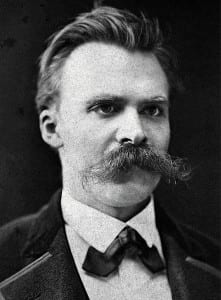Philosophy and theatre
By uclzean, on 4 June 2014
Forty minutes into Tom Stern’s (UCL Philosophy) UCL Festival of the Arts lecture he had the audience humming a drone-like melody and clapping their hands in time. A 12-strong tragic chorus concealed their faces with masks and turned to the stage as two volunteers recited the opening lines of Sophocles’s Oedipus Rex.
CREON: Before you came, my lord, to steer our ship of state, Laius ruled this land.
OEDIPUS: I have heard that, but I never saw the man.
CREON: Laius was killed. And now the god is clear: those murderers, he tells us, must be punished, whoever they may be.
OEDIPUS: And where are they? In what country? Where am I to find a trace of this ancient crime? It will be hard to track.
The audience continued to hum and clap but the hedonism was soon interrupted due to a complaint from a conference in the room below. A pity as it interrupted the near completion of the Apollonian unity Nietzsche had envisioned these events to be about. We had, at least, tasted what it would have been like to be at a religious worship of Dionysus that took place in amphitheatres over festival periods in Ancient Greece.
Stern is fresh from the publication of his book entitled Philosophy and Theatre which investigates how the two relate. He began by providing background into the history of both. This inevitably led to Ancient Greece, the birthplace of western philosophy and western theatre. ‘The tradition begins here. Both are Greek words. Philosophy means the love of wisdom and theatron means a place for viewing’.
 Close
Close



